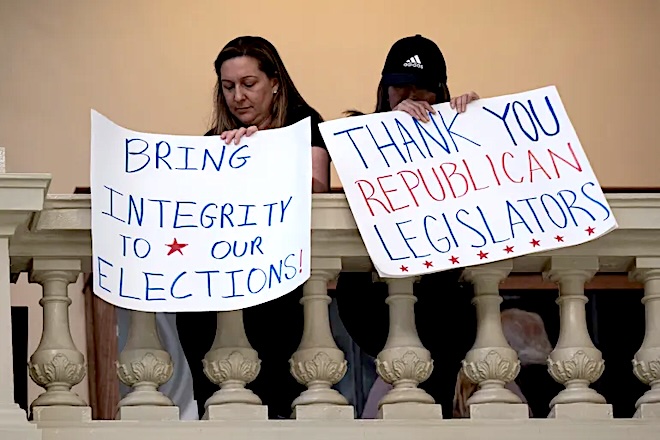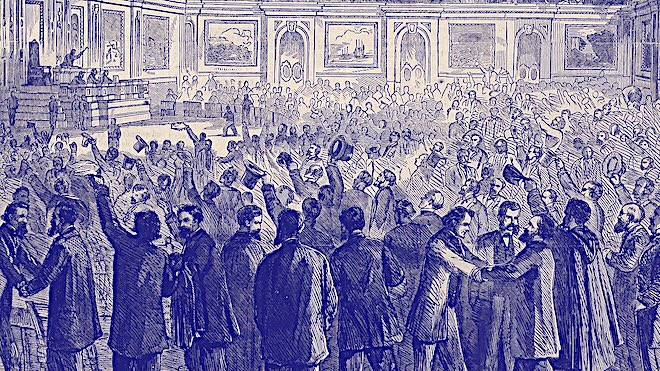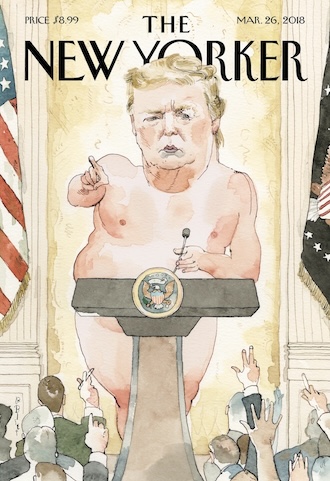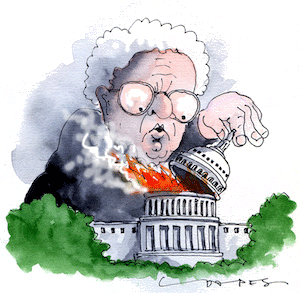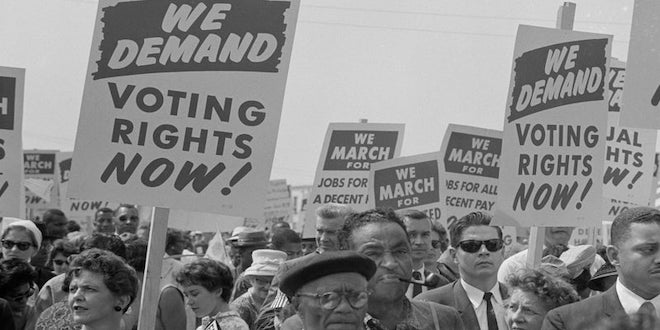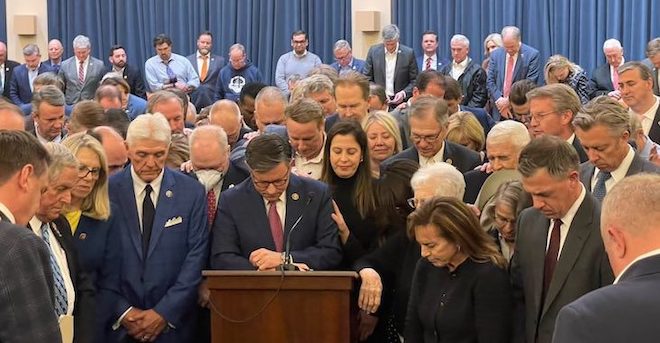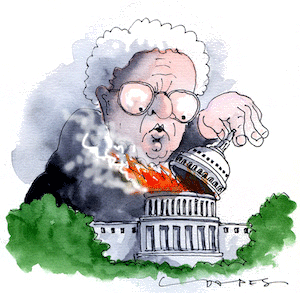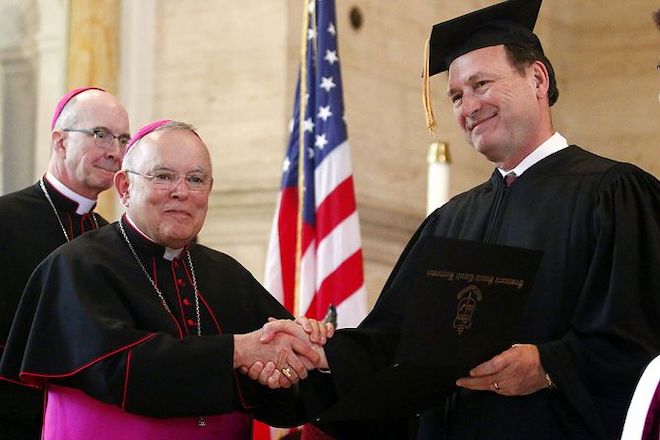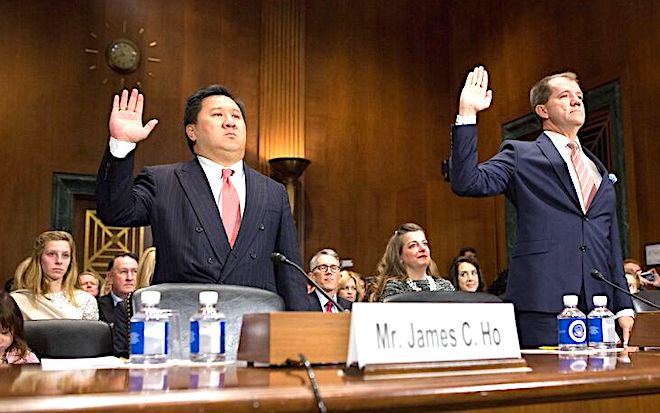Courtroom capers
Trump ... Looking for the cash bond ... Lenders likely to be stiffed ... Supreme Court bends over for Trump ... Novel arguments for immunity ... Idiocy has its appeal ... From Washington, Roger Fitch reports
"I often say Al Capone, he was one of the greatest of all time, if you like criminals" - Donald Trump
"Trump represents the culmination of gangster Gemeinschaft" - John Ganz
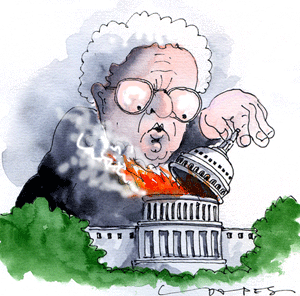 The first criminal prosecution of a former US president is about to begin, briefly delayed by the late production of federal court documents that Trump subpoenaed in January.
The first criminal prosecution of a former US president is about to begin, briefly delayed by the late production of federal court documents that Trump subpoenaed in January.
The defendant has a sordid history, and the NY trial concerns hush-money paid to a prostitute before the 2016 election; Trump's co-conspirator, Michael Cohen, has already been convicted and served time.
Trump's trial will be about election influence, an attempt to corrupt a presidential election.
Clearly, Judge Juan Merchan has Trump's measure: one pre-trial order requires jury anonymity, in light of the "likelihood of bribery, jury tampering, or of physical injury or harassment of juror(s)".
Another is a comprehensive gag order against Trump's endless insults and harassment of court witnesses, prosecutors and jurors.
NY federal judge Lewis Kaplan also ordered anonymous juries and a gag rule, in the writer Jean Carroll's successful civil cases against Trump. After the second Carroll verdict, Kaplan thanked the jurors for their service, and recommended they never tell anyone they had been jurors, for the rest of their lives.
This is New York. They know Donald Trump.
Moreover, the Times added, with MAGA threats:
"The intimidation is systemic and ubiquitous, an acknowledged tactic in the playbook of the Trump right that flows all the way down from the violent fantasies of Donald Trump himself. It is rare to encounter a public-facing Trump critic who hasn't faced threats and intimidation."
≈ ≈ ≈
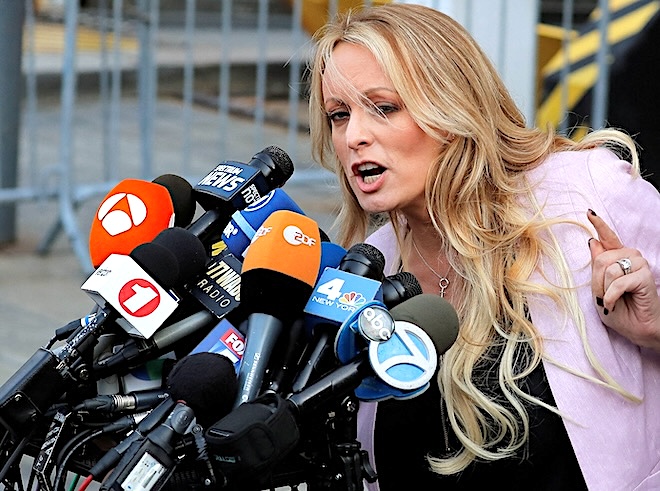 Stormy: hush
Stormy: hush
By co-incidence, there were two Trump court appearances on March 25. A date was set for the hush-money case (April 15), and March 25 was the deadline for Trump to post an appeal bond in the NY business fraud case in which Judge Arthur Engeron imposed a $356 million fine (with interest, $454+ million).
That amount, set for bond, was under appeal, and the Court of Appeals had not ruled.
Getting a bond that big was never going to be easy for the cash-strapped defendant, who, with his deadbeat reputation, barely managed to post a $91 million Carroll defamation appeal bond. The Times warned:
"If he reclaims the White House, it could be difficult for the bonding company to collect from a sitting president, particularly one who has stiffed lenders and lawyers in the past."
Over 30 companies rebuffed Trump's efforts to secure the second bond, but the resourceful defendant had a back-up scheme: he arranged for a "special-purpose acquisition" shelf company, stuffed with cash from his followers, to merge with his nearly-broke "Truth Social" media company, with shares to be listed on the NYSE (symbol DJT).
The plan: get the enterprise going in time for the new company's cash to be converted by Trump, the principal shareholder in time for March 25.
March 25 arrived, Trump had no bond, and DJT hadn't launched; would the defendant be found "swimming naked"? The classy ex-president was already so desperate, he was hawking $400 Trump shoes and $60 Trump-endorsed bibles.
Then, as the disgraced ex-president shuttled between New York courtrooms, a third event occurred: the long-awaited ruling in the pending appeal of the bond amount was announced, and it contained a $300 million reduction from the bond set by Judge Engeron.
Trump was given ten days to post a $175 million cash bond, and the ten days could make a difference: "DJT" finally went public, on March 26. It's share value doubled to $6 billion.
Meanwhile, Trump's newly-installed Republican National Committee chair, daughter-in-law Lara Trump, promises the RNC will give Trump's legal costs ($50 million so far) priority when disbursing party funds.
≈ ≈ ≈
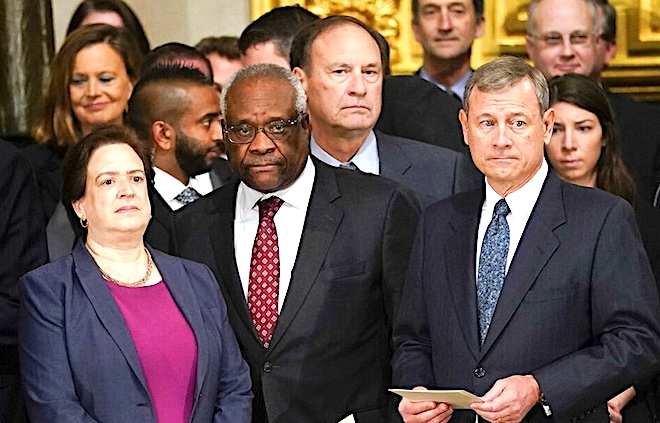 Thomas and Alito (centre): expected to endorse Trump's view of election and document thefts
Thomas and Alito (centre): expected to endorse Trump's view of election and document thefts
In Trump v Anderson, the Colorado case disqualifying Trump from office for insurrection, under Article 3 of the 14th amendment, the supreme court gave Donald Trump what he wanted: a bail-out and delay.
Professor Michael Dorf's legal analysis of the feckless court's dogs-dinner decision is probably the best on a judicial failure that has rekindled January 6 and could cause chaos. Moreover, Trump and 1,200 others charged in the January 6 riot can apparently run unimpeded for federal offices.
The New Republic, Lawfare, NYRB and Slate have more.
The court's ruling solved Trump's Article 3 problems. Was it part of a grand bargain of the justices in which Trump's farcical claim of absolute criminal immunity (still pending) will be disposed of in the government's favour?
Thus far, the supreme court has given Trump everything he wants. As the Times noted, the court is going out of its way to help him. The hearing in the total immunity case - so absurd it should never have been granted certiorari - is now set for the very last day of arguments in the 2023 term. What more could Trump's lawyers have hoped for? It's a bad sign.
There shouldn't have even been the four justices required to grant certiorari to Trump's nonsensical, counter-intuitive claims, e.g, that elections are an official concern of presidents and meddling in one may be an immune presidential act.
Trump's lawyers are also arguing that purloining and hoarding classified, government-owned documents is also an immune official act.
As in the immunity case, Clarence Thomas may participate, as he did in delivering a fifth vote for the majority opinion in Trump v Anderson, yet it's hard to imagine any justices besides Thomas and Sam Alito endorsing Trump's view of elections and document theft.
≈ ≈ ≈
It's wrong that a trial can't proceed during an election season: it's filing charges during that period that's disfavoured. Beginning a federal criminal trial before the election is essential, especially as the authoritarian Trump, if elected, would dismiss the charges, including the Espionage Act violations.
Nevertheless, Special Counsel Jack Smith is having difficulty making classified document charges against Donald Trump clear enough for Aileen Cannon, a clearly-unqualified and patently-prejudiced judge.
≈ ≈ ≈
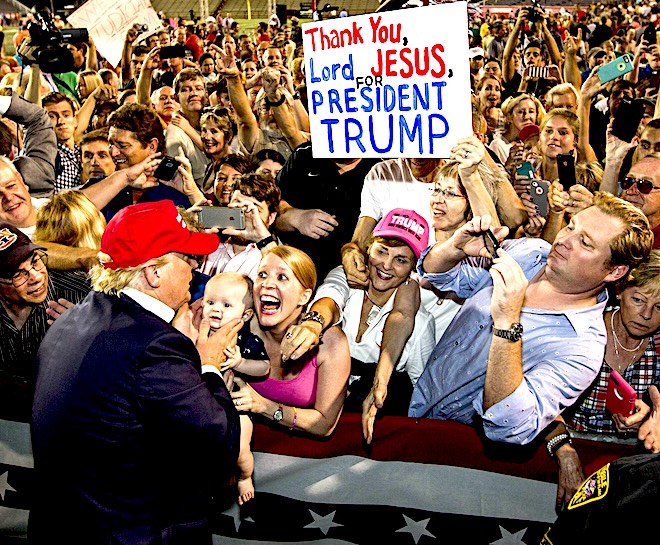 Fox News viewers
Fox News viewers
Aside from political appointees like Aileen Cannon, why would anyone prefer the chaotic Donald Trump over the accomplished Joe Biden?
Is it collective amnesia? shared psychosis? cognitive dissonance? Are these voters mesmerised by extrinsic values?
With Trump it could be the "low information trap": voters don't "get it" because they don't know about it, or are unable to engage in critical thinking, both consequences of Murdoch media.
A Salon writer thinks:
"It's not just that Trump's own intellectual baseline is so low. It's that Republican voters have lost the ability to notice when someone isn't making sense, having fried their minds on right-wing propaganda."
Maybe, as Salon theorises, "Trump's idiocy is part of his appeal. For every mediocre white guy who wants to coast on his privilege, Trump is an aspirational figure".
Or perhaps, as Trump has implied, his supporters just "like criminals".
The man himself certainly does.
